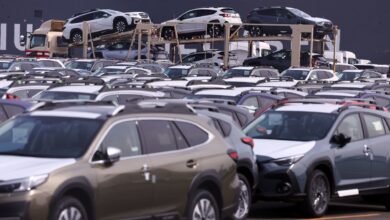Europe’s problems are mounting, and it’s struggling to fix them
From finding its place in the global world order to wrangling business competitiveness, Europe is facing a growing spate of challenges it’s struggling to address, political and business leaders told CNBC on the sidelines of the Ambrosetti Forum. “In a way, I see a Europe suffering from cholesterol,” Arancha González Laya, the dean at the Sciences Po University and former Spanish foreign affairs minister, told CNBC on Saturday. “The problems accumulate. None of these problems break your health today, but the problems accumulate, and one day you will discover that you have a heart attack,” he added. Others struck a similarly tone, with political advisor and former German State Secretary Markus Kerber describing Europe as “a bit like the rabbit in the headlight” — and saying the continent was struggling with the breakdown of the long-standing global rules-based system and order. “Europe does not know how to respond to that, because the rules-based world gave Europe all the advantages you wanted: low defense spending, high consumer confidence and nothing to worry about. So, you could almost fly the political and the economical system on an autopilot. But this is gone,” he said. Instead, Kerber flagged, “Europe has been waking up in what some political scholars have called the pentarchy. I mean a world that is more or less governed and influenced by the United States of America, the People’s Republic of China, India, EU and Russia.” Europe, he added, was not well equipped to manage the multilateral threats and opportunities at play. Lack of competitiveness One of the main charges against the continent is that it has failed to enact reforms in order to boost its economic competitiveness vis-à-vis trade rivals in the U.S. and Asia. But the region’s defenders say U.S. President Donald Trump’s trade war and tariffs, as well as the conflict in Ukraine, have left less time for inward-looking action to boost the continent’s attractiveness as a place to invest and do business. Europe knows it has a problem: in 2024, reports on competitiveness and the single market, compiled by former Italian Prime Ministers Mario Draghi and Enrico Letta detailed the challenges facing the continent — from slow growth and regulatory burdens that hinder innovation, to higher energy costs and a fragmented single market. These factors were making Europe fall behind the U.S. on a number of different metrics, with the Draghi report highlighting that a “wide gap” in GDP has opened up between the EU and its historical transatlantic ally, driven mainly by a more pronounced slowdown in productivity growth in Europe. “Europe’s households have paid the price in foregone living standards. On a per capita basis, real disposable income has grown almost twice as much in the U.S. as in the EU since 2000,” the report noted. International Monetary Fund data also reflects the slow decline of the EU’s economic output. Measured in terms of purchasing power parity (used to compare the economic well-being, living standards, and production volumes of countries by adjusting for differences in price levels), the EU’s share of world GDP has fallen from 27.5% in 1980 to 14.1% in 2025. EU Commissioner for Economy and Productivity Valdis Dombrovskis said efforts to address declining growth and competitiveness were underway, however. “One of the first initiatives of European Commission in this mandate was to set out what we call a ‘Competitiveness Compass,’ and, actually, it builds heavily on [the] Draghi and Letta reports, and our Competitiveness Agenda, which we are implementing right now,” Dombrovskis told CNBC at Ambrosetti. “There are elements you see exactly in the Draghi and Letta reports, including closing the innovation gap, including using the full potential of EU single market, including reduction of bureaucracy and simplification, all this is now firmly in the EU agenda and being implemented,” he added. But Carlos Cuerpo, Spain’s minister of Economy, Trade and Business, told CNBC that Europe needed to stop procrastinating when it comes to reforms to boost competitiveness. “We know what the big road map is. We know all the [competitiveness] recommendations from [Mario] Draghi, from [Enrico] Letta and we can agree on most of them … but then we need to avoid this sense of frustration of not being able to actually push through all those recommendations in Europe,” Cuerpo told CNBC’s Steve Sedgwick. “There is an element that needs to be more optimistic about what we can do and avoid these pessimistic narratives about Europe,” he noted. Competitiveness is a medium-term effort, Cuerpo said, “that needs to be instilled into our day to day, into our short-run actions, and that’s the most difficult part of it … We need to be moving on competitiveness.”




